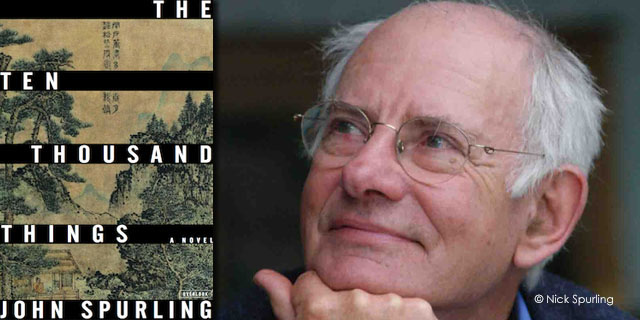Author spotlight: John Spurling
3rd June, 2015
The spotlight this week is on shortlisted writer John Spurling, author of The Ten Thousand Things.
The WSP asked him about the lead character in his novel, and his thoughts on being shortlisted.
What do you think about being shortlisted for the Walter Scott Prize for Historical Fiction? Do you see yourself as a historical novelist?
Absolutely delighted to be shortlisted, especially because I’m a great admirer of Walter Scott, have read all his fiction and have a small bust of him on my bookcase. I don’t see myself as specifically an historical novelist, since I regard us all as living in continuous history and believe that we can only understand ourselves in the light of history. The title of my first novel, The Ragged End, which had a mostly contemporary setting, meant the ragged end or still unwoven (or unknitted) edge of history where we find ourselves.
How and when did you first come across the story of Wang Meng?
I read a brief summary of Wang Meng’s life and saw an illustration of one of his paintings in Michael Sullivan’s book about Chinese landscape, Symbols of Eternity.
Your books and plays have dealt with an extraordinarily diverse range of periods and settings. How do these people and places lodge in your imagination?
I have read a great many books both for review and my own interest and entertainment and, as an art critic, have seen a great many exhibitions and, as a playwright, a great many plays. I read about Che Guevara – the subject of my first play – in a brief column in the Observer, when he was still alive in the Bolivian jungle. I read Chairman Mao’s ‘Little Red Book’ in the days of the Red Guards, I read about Ovid and the Emperor Augustus long ago when I studied Ancient History at school, I saw Aztec artifacts in the British Museum, I saw the Japanese Bunraku puppets in a London theatre, I read Frances Yates’s book Theatre of the World, and all those subjects came together and echoed one another in my play In the Heart of the British Museum. And so on.
At which point do you let fiction take over from fact?
The facts provide a sort of armature and the fiction clothes it in the process of writing the story. I hate making synopses for that reason – they inhibit the imagination, which discovers the story in the act of writing it.
John Spurling’s book The Ten Thousand Things is published by Duckworth.
John will be taking part in our Walter Scott Prize discussion event at 3.15pm in the Harmony Marquee on Saturday 13 June Buy tickets
Buy tickets for the Walter Scott Prize Ceremony at 5.15pm in The Times Marquee on Saturday 13 June

